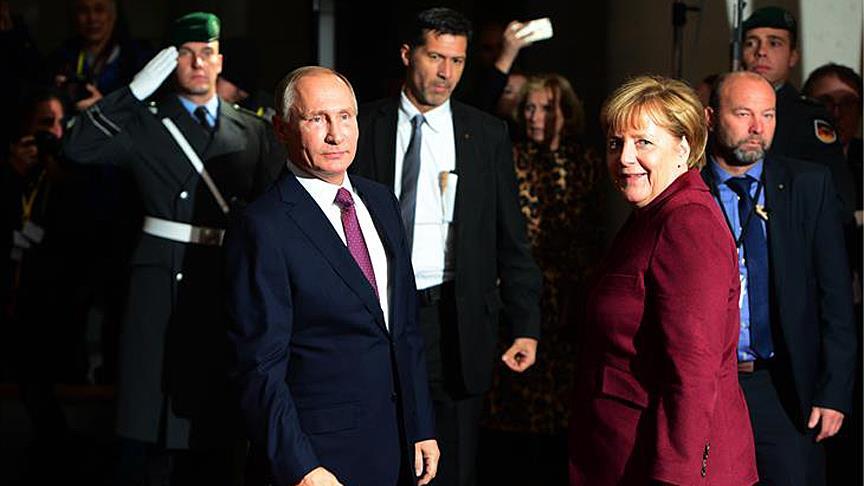Leaders agree to ‘road map’ for Ukrainian cease-fire
Poroshenko says Berlin summit agreed on steps to achieve progress in implementing Minsk deal
 German Chancellor Angela Merkel (R) meets with President of Russia Vladimir Putin (L) for the summit on Ukrainian and Syrian issues where Normandy Four Leaders participate at Chancellery in Berlin, Germany on October 19, 2016. ( Maurizio Gambarini - Anadolu Agency )
German Chancellor Angela Merkel (R) meets with President of Russia Vladimir Putin (L) for the summit on Ukrainian and Syrian issues where Normandy Four Leaders participate at Chancellery in Berlin, Germany on October 19, 2016. ( Maurizio Gambarini - Anadolu Agency )
Berlin
BERLIN
The leaders of Germany, France, Russia, and Ukraine have agreed to develop a “road map” for a peaceful solution to the conflict in eastern Ukraine, that country’s President Petro Poroshenko said Wednesday.
“We agreed to create a roadmap - ministers of foreign affairs will adopt the basis till the end of November,” Poroshenko’s office tweeted after the five-hour meeting in Berlin.
German Chancellor Angela Merkel, Russian President Vladimir Putin, French President Francois Hollande and Poroshenko gathered in Berlin for the first time in more than a year for a four-party meeting, amid intensified fighting in eastern Ukraine between government troops and pro-Russian separatists.
Poroshenko said the summit yielded some positive results and Russia supported the establishment of a police mission in Donbass by the Organization for Security and Cooperation in Europe (OSCE), which monitors the cease-fire in eastern Ukraine.
“There’s no alternative for Normandy Four meetings. We stressed on this once again during the talks,” he said.
The last meeting of the four leaders in the Normandy format was held last October in Paris but ended without any major breakthrough.
Ukraine has been wracked by conflict since April 2014 following Russia’s annexation of Crimea from Ukraine.
Fighting between Ukrainian government forces and pro-Russia separatists has killed 9,500 victims, according to the UN.
Despite the Minsk cease-fire agreement between the Ukrainian government and pro-Russian separatists in February 2015, implementation remained stalled.
Under the deal, the conflict parties were required to withdraw heavy weaponry from combat areas, ensure withdrawal of all foreign armed groups and take steps toward political reforms and decentralization in the eastern Ukrainian regions.
Crimea was formally annexed by Moscow in March 2014 after an illegal independence vote on the heels of violent anti-government protests in the Ukrainian capital, Kiev, that led to the overthrow of then-President Victor Yanukovich.
The UN General Assembly voted almost unanimously to proclaim the annexation illegal.
Along with many other UN members, including the U.S. and the EU, Turkey does not recognize Crimea as Russian territory.
Anadolu Agency website contains only a portion of the news stories offered to subscribers in the AA News Broadcasting System (HAS), and in summarized form. Please contact us for subscription options.







